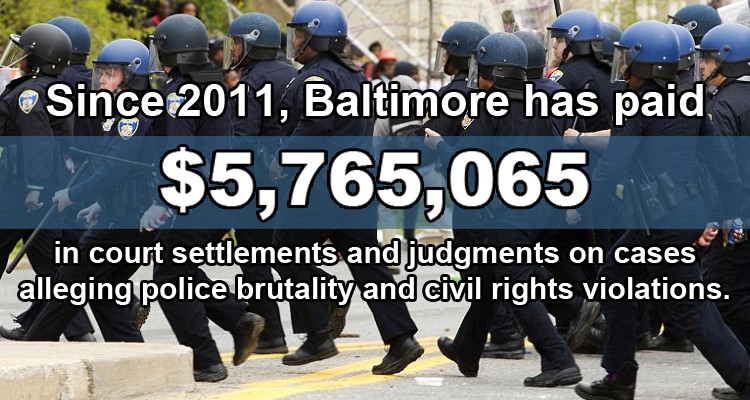
The problems in Baltimore didn’t begin with the death of Freddie Gray, a 25-year-old man who suffered a spinal cord injury earlier this month after being arrested by city police.
As widespread violence, chaos and looting overtook the city in the wake of Gray’s funeral service on Monday, civil rights leader the Rev. Jesse Jackson stated that:
It’s regrettable, what’s happening now. What you’re looking at is the end result of mutual distrust between the people the police, and something needs to happen to contain and stop the rioting … You’re looking at the actions of cynicism and hopelessness.
Unfortunately, Jackson’s observation is all too true.
The Baltimore Sun conducted an in-depth investigation of police corruption last year, finding that over the course of the last four years, more than 100 people in Baltimore have won court judgments or settlements totaling more than $5.7 million related to allegations of brutality and civil rights violations.
Victims include a 15-year-old boy riding a dirt bike, a 26-year-old pregnant accountant who had witnessed a beating, a 50-year-old woman selling church raffle tickets, a 65-year-old church deacon rolling a cigarette and an 87-year-old grandmother aiding her wounded grandson.
Noting that “those cases detail a frightful human toll,” The Baltimore Sun reported that:
Officers have battered dozens of residents who suffered broken bones — jaws, noses, arms, legs, ankles — head trauma, organ failure, and even death, coming during questionable arrests. Some residents were beaten while handcuffed; others were thrown to the pavement.
And in almost every case, prosecutors or judges dismissed the charges against the victims — if charges were filed at all.
The Baltimore Sun continued their report, adding that:
Although police officials declined to release individual personnel records, they did discuss the issue in broad terms, saying that from 2012 through July, the department received 3,048 misconduct complaints against officers. Of those, officials sustained 1,203 complaints — 39 percent — meaning investigators could prove the claims were true.
City Council President Bernard C. “Jack” Young stated that: “These officers taint the whole department when they create these kinds of issues for the city,” adding “I’m tired of the lawsuits that cost the city millions of dollars by some of these police officers.”
The Baltimore Sun’s investigation, “which included a review of thousands of court records and interviews with victims, along with audio and video recordings of trials,” also found that:
For years, leaders in Baltimore’s Police Department, the nation’s eighth-largest, didn’t track or monitor the number of lawsuits filed against each officer. As a result, city officials were unaware that some officers were the target of as many as five lawsuits.
Additionally, their findings are limited to lawsuits that have been settled or decided in court; while there remains literally dozens of similar cases that are still pending. “The city has faced 317 lawsuits over police conduct since 2011 — and recently budgeted an additional $4.2 million for legal fees, judgments and lawsuits, a $2.5 million increase from fiscal 2014.”
To put this in perspective, only 26 cases have resulted in court judgments or settlements against the Dallas Police Department since 2011 and “the Miami-Dade County department paid $1.8 million over that period in an unspecified number of cases.” And it is important to note that “both agencies are similar in size to Baltimore’s.”
In a report published earlier today, Ezra Klein observed that:
The real cost of police brutality isn’t found in court-ordered payouts and billable hours. It’s in the deep mistrust between the community and the cops who serve it. It’s in the resentment, the anger, the fury that proves dry kindling when police strike the wrong match.
Speaking about the current situation in Baltimore, Klein added:
We don’t know what happened when the police arrested Freddie Gray, who died of a spinal injury in police custody. But the anger driving the protests in Baltimore began before Freddie Gray. It began with a community that feels mistreated, even brutalized, by its police force. It began with a community where 51 percent of working-age adults don’t have a job, where a third of residential properties are either vacant or abandoned, where life expectancy is 68 years — equal to that of Laos or Tajikistan, and more than 10 years below the United States average.

You must be logged in to post a comment Login